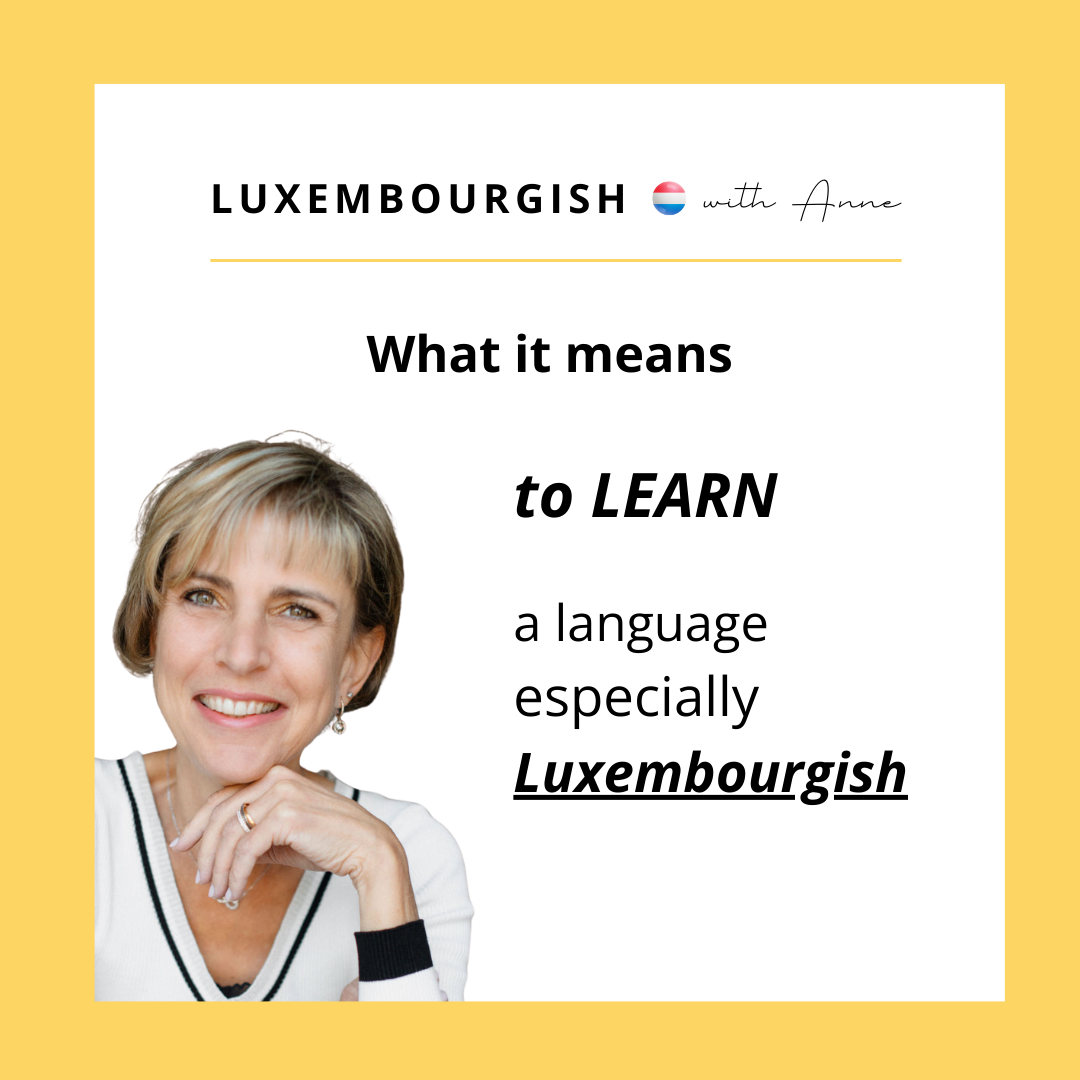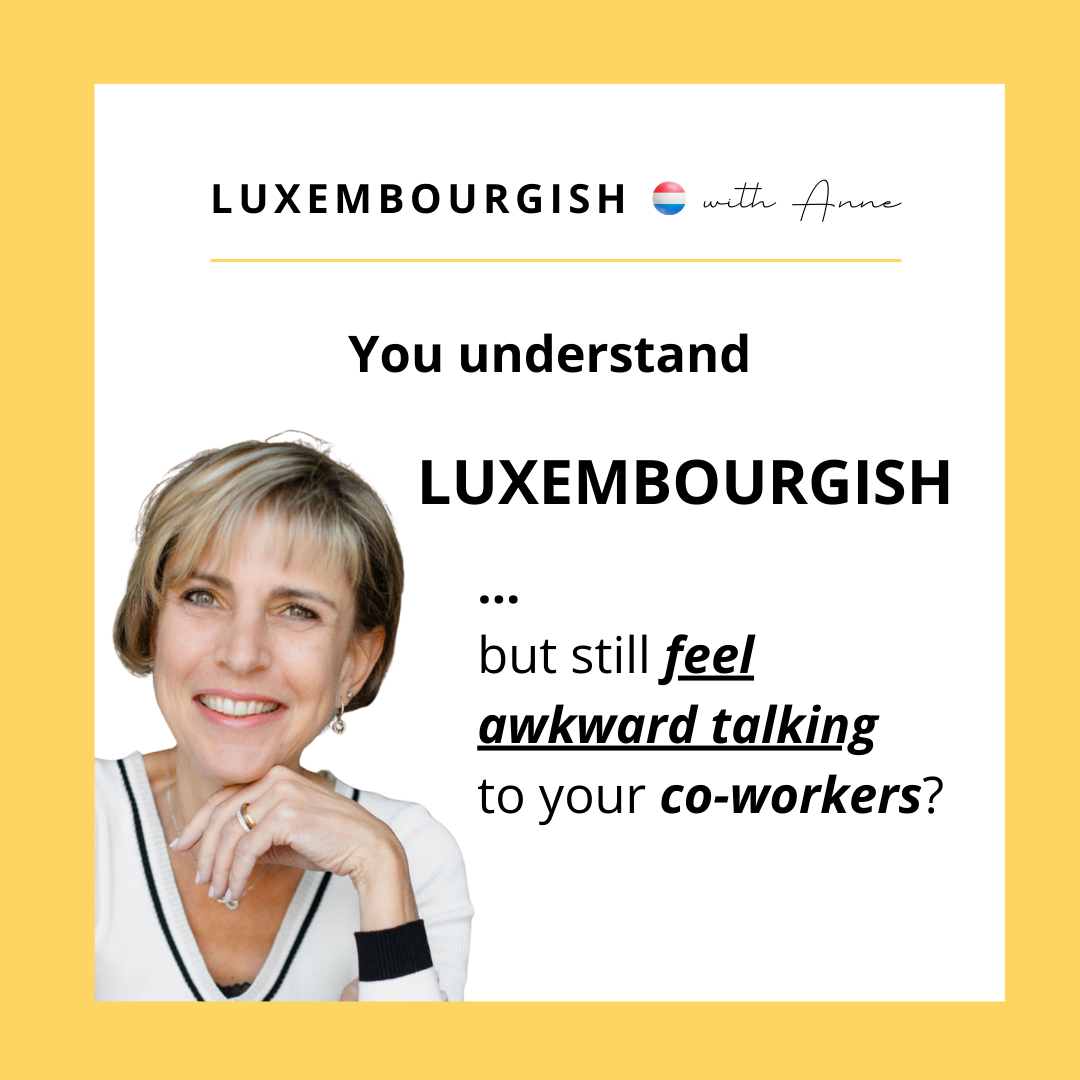Have you ever eaten something truly delicious… and said, “‘t ass net schlecht”?
And then wondered why it felt a little awkward? 😬
When someone cooks a meal for you or brings something special to share, you want your words to feel warm and sincere. But sometimes, the phrases that come to mind in Luxembourgish sound flat or vague.
So it’s so important to know not only what to say in Luxembourgish but also how and when to say it in a way that feels true to you.
That’s why in today’s episode, you’ll learn 20 natural Luxembourgish phrases for food compliments that match the moment and help you build real connection — whether you’re at a dinner party, eating out, or celebrating with colleagues.
We’ll look at five everyday situations, where food compliments come up – for example dinner at someone’s home, or receiving food as a gift etc – and the exact phrases you can use to sound confident, thoughtful, and fluent in Luxembourgish.

5 Real-Life Situations + 20 Phrases to Compliment Food in English
Let’s look at these five everyday situations where food compliments come up and the exact phrases you can use to sound confident, thoughtful, and fluent.
1. Owesiessen bei engem doheem – Dinner at Someone’s Home
Imagine this: You’ve been invited to a friend’s house with other people you don’t know. The table is set. The food is homemade. You want to show genuine appreciation—not just for the taste, but for the care that went into it.
Try these compliments:
- Du hues dech wierklech iwwertraff. Dat ass absolut lecker. – You’ve really outdone yourself. This is absolutely delicious.
- Dat schmaacht esou gutt, de Gout ass einfach himmlesch. – This tastes so good, the flavor is simply heavenly.
- Däin Iessen ass exzellent. Et ass e richtege Genoss. Your food is excellent. It’s a real delight (to eat).
These expressions feel warm and personal, without being too much.
2. Grillfest am Gaart oder Picknick – Backyard BBQ or Picnic
At a casual get-together, native speakers often use expressive, even playful, compliments.
Saying “This is good” might feel polite, but it doesn’t create a connection.
Try:
- Dëse Burger ass fantastesch – esou säfteg a voller Gout. – This burger is amazing—so juicy and flavorful.
- Deng Gromperenzalot ass einfach lecker. Du muss mir d’Rezept ginn. – Your potato salad is just delicious. You’ve got to give me the recipe!
- Ech hunn dat mega gär. Einfach mee gutt. – I love this! Simple but so good.
- Dat schmaacht herrlech, ech kéint nach eng drëtt Portioun huelen. That tastes wonderful, I might go back for thirds.
3. Iessen am Büro – Food Brought to the Office
A colleague brings in a homemade cake or cookies. You want to be gracious, but still keep it appropriate for work.
Try:
- Däi Kuch ass absolut perfekt. En huet déi richteg Konsistenz an de Gout ass wonnerbar. – Your cake is absolutely perfect. It has the right consistency and the taste is wonderful
- Hues du déi Kichelcher selwer gebak? Se si fantastesch! Did you make these cookies? They are amazing.
- Ei, dee Kuch schmaacht awer esou gutt! Ech kéint e ganz opiessen! Wow, this cake tastes so good. I could eat it all!
4. Iessen geschenkt kréien – Receiving Food as a Gift
When someone gives you food—maybe a jar of jam, banana bread, or something special from their culture—it’s not just about the food. It’s about the gesture.
Try:
- Merci, dat gesäit fantastesch aus. Ech kann et net erwaarden, et ze probéieren. – Thank you, this looks amazing. I can’t wait to try it.
- Dat ass esou léif vun dir. Merci, dass de un mech geduecht hues. –This is so thoughtful. Thank you for thinking of me.
- Dat ass léif! Wat fir eng flott Iwwerraschung. – This is thoughtful! What a lovely surprise.
5. Eating Out at a Restaurant
Dining out is a great opportunity to practice polite, specific compliments—especially if someone else chose the place or if the meal surprises you.
Try:
- Dat ass esou gutt. Ech hat mer et net esou lecker erwaart. – This is so good! I didn’t expect it to be this delicious.
- D’Presentatioun ass schéin, an de Gout ass exzellent. – The presentation is beautiful, and the flavor is exquisite.
- Dat war eng super Iddi fir heihinner ze kommen. Merci, datt s de dës Plaz virgeschloen hues. – This was a great idea to come here. Thank you for suggesting this place.
What If You Don’t Like the Food?
This happens. The good news? You can still be kind and appreciative.
For example in a restaurant if the waiter asks you after dinner: How was it? Try this:
- Et war gutt, awer et war net ganz mäi Goût. – It was good, but it but it wasn’t really my flavor.
Or at friends:
- Et ass ëmmer schéin eppes Neies ze schmaachen. It’s always nice to try something new.
Or at the office:
- Dat ass net grad mäi Goût, mee ech appréciéieren et awer, datt’s de et mat eis deels. – It’s not quite my taste, but I really appreciate you sharing it with us.
These kinds of compliments help you stay polite, without pretending.
Want to combine real-life speaking practice with your vocabulary?
Learning vocabulary is powerful. But using it — in real conversations — is what brings true fluency. That’s exactly what we do inside the Conversation Class Schwätz mat eis A2 / B1
If you’re ready to feel safe, supported, and fluent in Luxembourgish — join us for weekly sessions, speaking practice, and gaining the confidence you need to eventually dare speaking in everyday life. All the details HERE.




